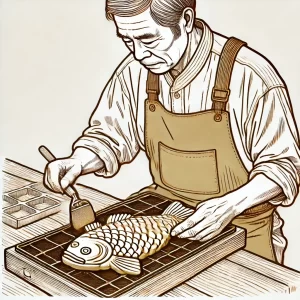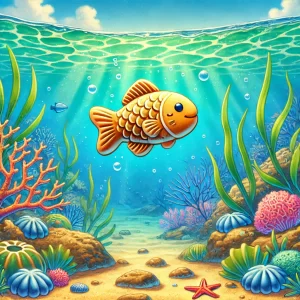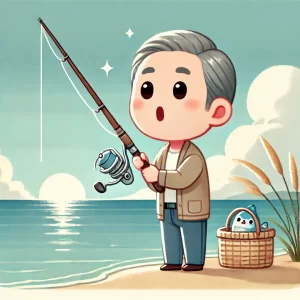およげ!たいやきくん [Oyoge! Taiyaki-kun]
子門真人 [SHIMON Masato]
Words : 高田ひろお [TAKADA Hiroo]
Music : 佐瀬寿一 [SASE Juichi]
“Oyoge! Taiyaki-kun” is a children’s song that was released in 1975 as part of the TV program Hirake! Ponkikki, and it became extremely popular.
Hirake! Ponkikki was a children’s show broadcast from 1973 to 1993. Although different in focus, it was modeled after the American educational program Sesame Street, and it was produced with a target audience of children aged five and up. Many songs were created for the show. By the way, Sesame Street was also aired in Japan, and when I was a child, I used to watch both Sesame Street and Ponkikki.
Before explaining the lyrics, I should talk about the “taiyaki” mentioned in the title “およげ!たいやきくん / Oyoge! Taiyaki-kun” (=Swim! Taiyaki-kun). Taiyaki is a traditional Japanese sweet made by baking batter in a fish-shaped metal mold, filled with sweet red bean paste, and it’s usually sold at food stalls. It seems to be sold in some places abroad, like in the U.S. Incidentally, Steven Tyler from Aerosmith reportedly became quite obsessed with taiyaki and passionately talked about his love for it on Japanese TV. I highly recommend everyone try it at least once.

The term “くん / kun” is an honorific used with names to express familiarity or slight respect, often for males. My name is Takuya, and when I was a kid, I used to be called “Takuya-kun.” Similarly, there are honorifics like “ちゃん / chan” and “さん / san.” “ちゃん / chan” is a term of affection and is often used for girls’ names or cute things like animals. “さん / san” expresses respect rather than affection. Now that I’m an adult, I’m often called “Takuya-san.”
The lyrics of this song tell a whimsical story about a taiyaki that comes to life. Referring to the taiyaki with affection as “Taiyaki-kun” is a heartwarming touch, which gives the song its child-friendly feel.
Masato Shimon is a singer who has performed many songs for children’s anime.
Since this is a children’s song, all the lyrics are written in hiragana.
まいにち まいにち
mainichi mainichi
ぼくらは てっぱんのうえで
bokura wa teppan no ue de
やかれて いやになっちゃうよ
yakarete iya ni nacchau yo
- 毎日(まいにち) [mainichi] : every day
- 僕ら(ぼくら) [bokura] : we
- 鉄板(てっぱん) [teppan] : griddle
- 上(うえ) [ue] : on
- 訳(わけ) [wake] : reason
- 嫌になる(いやになる) [iya ni naru] : get tired of
(translation) “Every day, every day,
we’re on the griddle, getting tired of it all.”
The narrator is “Taiyaki-kun,” but here, the lyrics are presented objectively, which makes them a bit strange. The fact that taiyaki are being grilled every day is part of the routine of the shop owner, not the taiyaki itself. But this kind of fuzzy logic is what brings out the fantasy.
あるあさ ぼくは みせのおじさんと
aru asa boku wa mise no ojisan to
けんかして うみに にげこんだのさ
kenka shite umi ni nigekonda no sa
- ある [aru] : some
- 朝(あさ) [asa] : morning
- 僕(ぼく) [boku] : I
- 店(みせ) [mise] : shop
- おじさん(おじさん) [ojisan] : man
- けんかする(けんかする) [kenka suru] : quarrel
- 海(うみ) [umi] : sea
- 逃げる(にげる) [nigeru] : escape
(translation) “One morning, I had a quarrel with the shop owner and ran away to the sea.”
The taiyaki has now become a fish.
はじめて およいだ うみのそこ
hajimete oyoida umi no soko
とっても きもちが いいもんだ
tottemo kimochi ga ii monda
おなかの アンコが おもいけど
onaka no anko ga omoi kedo
うみは ひろいぜ こころがはずむ
umi wa hiroize kokoro ga hazumu
ももいろサンゴが てをふって
momoiro sango ga te o futte
ぼくの およぎを ながめていたよ
boku no oyogi o nagamete ita yo
- 初めて(はじめて) [hajimete] : for the first time
- 泳ぐ(およぐ) [oyogu] : swim
- 底(そこ) [soko] : bottom
- とっても [tottemo] : very
- 気持ちがいい(きもちがいい) [kimochi ga ii] : feels good
- おなか [onaka] : stomach
- あんこ [anko] : red bean paste
- 重い(おもい) [omoi] : heavy
- 広い(ひろい) [hiroi] : wide
- 心(こころ) [kokoro] : heart
- はずむ [hazumu] : bounce
- 桃色(ももいろ) [momoiro] : pink
- サンゴ(さんご) [sango] : coral
- 手をふる(てをふる) [te o furu] : wave (verb)
- 泳ぎ(およぎ) [oyogi] : swimming
- 眺める(ながめる) [nagameru] : watch
(translation) “For the first time, I swam at the bottom of the sea.
It felt so good,
even though the red bean paste in my stomach was heavy.
The sea is vast, and my heart is bouncing with joy.
Pink coral waved
as it watched me swim.”
Though the song remains in a minor key, the scene where “the heart bounces” offers some relief.

まいにち まいにち たのしいことばかり
mainichi mainichi tanoshii koto bakari
なんぱせんが ぼくの すみかさ
nanpasen ga boku no sumika sa
- 楽しい(たのしい) [tanoshii] : fun
- こと [koto] : thing
- ばかり [bakari] : only
- 難破船(なんぱせん) [nanpasen] : shipwreck
- すみか [sumika] : dwelling
(translation) “Every day, every day, it’s nothing but fun.
A shipwreck is my home.
ときどき サメに いじめられるけど
tokidoki same ni ijimerareru kedo
そんなときゃ そうさ にげるのさ
sonna tokya sōsa nigeru no sa
- ときどき [tokidoki] : sometimes
- サメ(さめ) [same] : shark
- いじめる [ijimeru] : bully
- そんな [sonna] : such
- 時(とき) [toki] : time
- そう [sō] : yes
- 逃げる(にげる) [nigeru] : escape
(translation) “Sometimes I get bullied by sharks,
but in such cases, yes, I just run away.”

いちにち およげば ハラペコさ
ichinichi oyogeba harapeko sa
めだまも クルクル まわっちゃう
medama mo kurukuru mawacchau
たまには エビでも くわなけりゃ
tamani wa ebi demo kuwanakerya
しおみず ばかりじゃ ふやけてしまう
shiomizu bakari ja fuyakete shimau
- 一日(いちにち) [ichinichi] : one day
- 腹ペコ(はらぺこ) [harapeko] : hungry
- めだま [medama] : eyeball
- くるくる [kurukuru] : spinning
- 回る(まわる) [mawaru] : spin
- たまに [tamani] : occasionally
- エビ(えび) [ebi] : shrimp
- 食う(くう) [kuu] : eat
- 塩水(しおみず) [shiomizu] : saltwater
- ばかり [bakari] : only
- ふやける [fuyakeru] : become soggy
(translation) “After swimming for a whole day, I get really hungry,
and my eyeballs spin around.
I have to eat a shrimp once in a while, or
I’ll get all soggy from drinking only saltwater.”
“腹ペコ / harapeko” is a combination of “腹 / hara” (=belly) and “ペコペコ / pekopeko” (=the sound of something denting) — an onomatopoeia. “Kurukuru” also represents spinning motion.
He gets hungry, he can’t get soggy unless it’s saltwater, and he’s filled with red bean paste. …What kind of structure does this “Taiyaki-kun” even have? It’s really amusing.
いわばの かげから くいつけば
iwaba no kage kara kuitsukeba
それは ちいさな つりばりだった
sore wa chiisana tsuribari datta
- 岩場(いわば) [iwaba] : rocky shore
- 影(かげ) [kage] : shadow
- 食いつく(くいつく) [kuitsuku] : to bite
- それ [sore] : that
- ちいさな [chiisana] : small
- 釣り針(つりばり) [tsuribari] : fishing hook
(translation) “When I bit from the shadow of the rocky shore,
it turned out to be a small fishing hook.”
どんなに どんなに もがいても
donnani donnani mogaitemo
ハリが のどから とれないよ
hari ga nodo kara torenai yo
はまべで みしらぬ おじさんが
hamabe de mishiranu ojisan ga
ぼくを つりあげ びっくりしてた
boku o tsuriage bikkuri shiteta
- どんなに [donnani] : however much
- もがく [mogaku] : struggle
- 針(ハリ) [hari] : hook
- のど [nodo] : throat
- とれる [toreru] : come out
- 浜辺(はまべ) [hamabe] : beach
- 見知らぬ(みしらぬ) [mishiranu] : unknown
- 釣り上げる(つりあげる) [tsuriageru] : fish up
- びっくりする [bikkuri suru] : be surprised
(translation) “No matter how much I struggled,
the hook wouldn’t come out of my throat.
An unknown man on the beach
fished me up, and he was shocked.”
This “おじさん / ojisan” (=man) is not the same as the shop owner. It’s an unexpected twist.

やっぱり ぼくは タイヤキさ
yappari boku wa taiyaki sa
すこし こげある タイヤキさ
sukoshi koge aru taiyaki sa
おじさん つばを のみこんで
ojisan tsuba o nomikonde
ぼくを うまそうに たべたのさ
boku o umasō ni tabeta no sa
- やっぱり [yappari] : after all
- すこし [sukoshi] : a little
- こげ [koge] : burn marks
- つば [tsuba] : saliva
- 飲み込む(のみこむ) [nomikomu] : swallow
- うまそうに [umasō ni] : deliciously
- 食べる(たべる) [taberu] : eat
(translation) “After all, I’m just a taiyaki.
A slightly burned taiyaki.
The man swallowed his saliva
and ate me with relish.”
It’s puzzling why a song with such gloomy elements became so popular among children, but I think the music and Masato Shimon’s vocals must have made it entertaining. Of course, the lyrics are both dark and amusing at the same time.
Perhaps I should have mentioned this earlier, but this song’s record sold over 4.57 million copies, making it the best-selling single in Japan in terms of physical media. While most sales records were set in the 1990s, this song still holds first place with over a million more copies sold than the second-place holder.
At the time, this song sparked a social phenomenon, with long lines forming at taiyaki shops and taiyaki grills selling out.
You can still find unofficial videos of the original anime on YouTube.
YouTube Search “Oyoge! Taiyaki-kun – Masato Shimon”
Thanks for reading! Feel free to comment if you have any feedback or questions.
Follow me on X.



